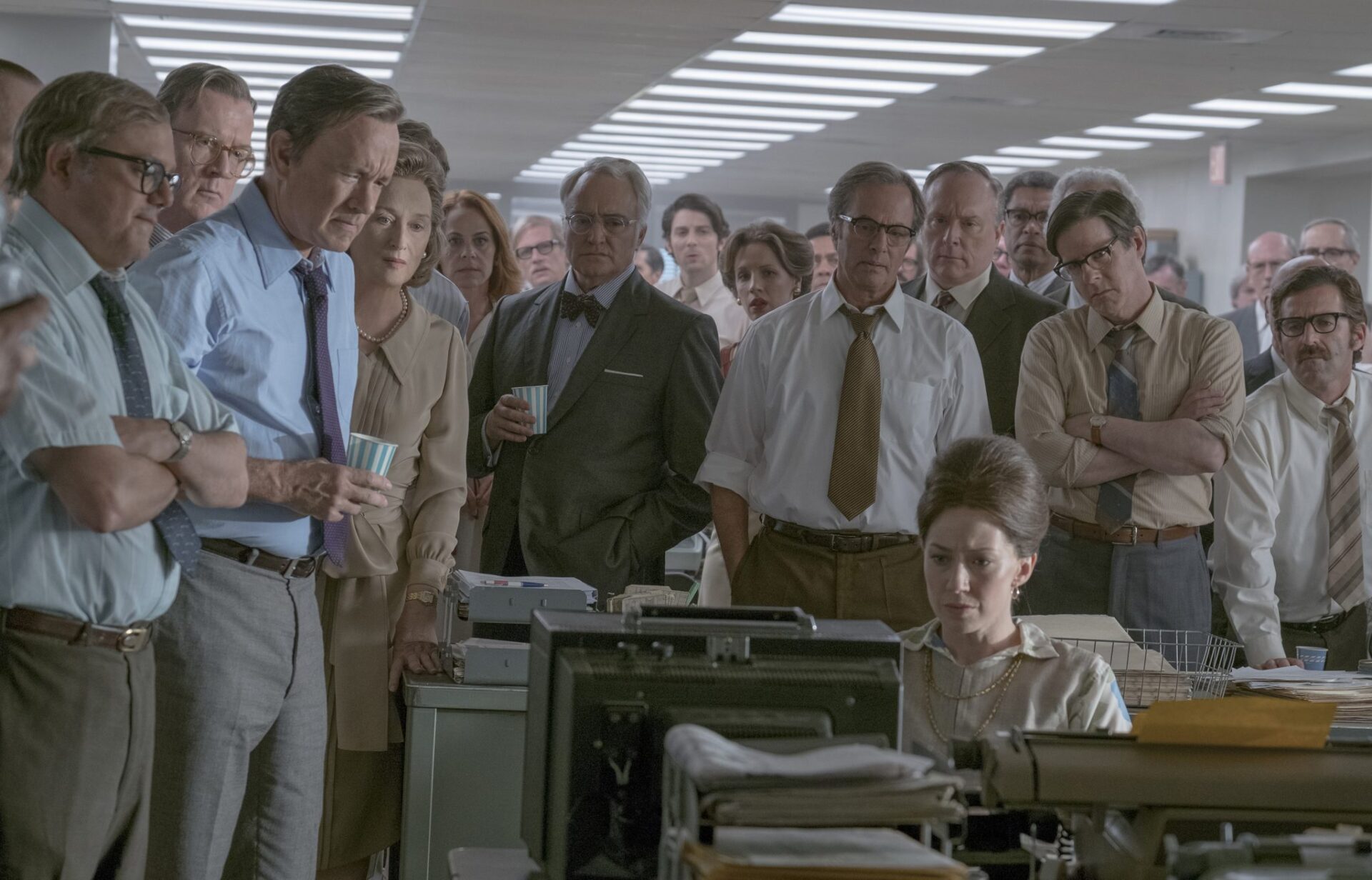There’s a realization that I came to during The Post: For all of its thrill-a-minute qualities, of which there are many, I wasn’t entirely sure if it was a good film or not. I knew it was an ephemeral rush to see a blockbuster filmmaker make a blockbuster out of do-good reporting during the Nixon era. More than just being a film of the moment, it relies on this main conceit that the Washington Post staff are the good guys and many of the establishment are but flawed men who deserve some modicum of forgiveness for lying to the American Public about the war in Vietnam. That doesn’t strike true to me. To create this narrative, Steven Spielberg and the shaky script written by Liz Hannah and Josh Singer put the Washington Post staff on a pedestal. That staff risked their careers to do what is right by the public. But if we’re going to hold up a mirror to the government’s own wrongdoings, shouldn’t we hold up a mirror to ourselves?
Executive Editor Ben Bradlee (Tom Hanks) had a very good friendship with JFK before his assassination. Was he complicit with the US’s intervention in Vietnam because he was so close to the president? Not entirely, but let’s roll it back on the pious assumption that people like Bradlee were without moral fault. The Post even makes it a point to bring up his relationship with JFK, but there’s no self-reflection. If you’re going to make a film about the injustices once done by our government, with a clear commentary on how that relates to Trump’s presidency, then why not make that self-reflection apply to more than just the government and its misdeeds?
That doesn’t stop Spielberg from trying to grind down those edges, though. For a film so dedicated to showcasing the humble efforts done by these journalists to release The Pentagon Papers in the proper manner, we’re presented every twist and turn like it were a Cold War thriller, as if Tricky Dick’s goons were around every corner, ready to pounce on the first person they see carrying government secrets. It’s all thrilling in the hands of Spielberg, who time and time again has shown that two people talking in a room can be so much more than just that.
The script values speechifying over everything else. Morsels of character development get thrown in the middle of long, drawn out speeches about doing the right thing. Yet under Spielberg’s direction it never feels rote. Again, my gripes with The Post did not come clear until days after watching it. It can feel like such a rallying cry against the current presidency that you can’t help but get swept up in the madness that was Richard Nixon’s treasonous acts against the American people. Although, there’s a sequence right before the final credits that I can’t believe exists in a film about journalistic integrity. None of the proceedings feel like hand-holding until the final sequence, which may end up being one of the most cartoonish thing Spielberg ever commits to film.
The ensemble is one of the year’s best here, too. Tom Hanks’s chain-smoking and grumbling Bradlee is an essential moment in Hanks’s career. It’s a role that feels equal measures Cary Grant in His Girl Friday and Kirk Douglas in Ace in the Hole. Though Bradlee can come off as ornery and insensitive in his quest to deliver the news, Hanks gives the role his trademark warmness. He’s one of the only actors that can deliver an insult like a compliment. Meryl Streep’s Kay Graham even feels like much more than just awards bait. While Graham seems lost in the fact that her societal affairs interfere with the paper’s responsibility to the public, there’s nary an actress that can carry such a role with the grace of Meryl Streep. The push and pull between those responsibilities sets up much of the action to take place, and none of it feels like tired drama. The Post understands that most of us know how the story ends, but it’ll be damned if it doesn’t make those proceedings as entertaining as possible.
Quick shoutout to cinematographer Janusz Kaminski for once again making the normal feel new and exciting. The running of printing presses contrasted with the rush brought on by the uncovering of government secrets creates something workmanlike, which the film is sorely missing most of the time.
Don’t go to see Spielberg grappling with why stories like these work dramatically. Go because this master still remains nimble no matter the slighted material given to him. He’s one of the few directors that can enliven material that doesn’t care to be more than just narrow-minded. And when I mean narrow-minded, I mean completely missing the point as to what The Pentagon Papers revealed about a democracy believed to be beyond reproach.













